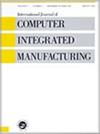A framework to design smart manufacturing systems for Industry 5.0 based on the human-automation symbiosis
IF 4
3区 工程技术
Q2 COMPUTER SCIENCE, INTERDISCIPLINARY APPLICATIONS
International Journal of Computer Integrated Manufacturing
Pub Date : 2023-09-20
DOI:10.1080/0951192x.2023.2257634
引用次数: 0
Abstract
ABSTRACTThe concept of Industry 5.0 (I5.0) promotes the human-centricity as the core value behind the evolution of smart manufacturing systems (SMSs), based on a novel use of digital technologies in the design and management of modern industrial systems to take up the socio-technical challenges. In this context, the paper proposes a Smart Manufacturing Systems Design (SMSD) framework enabling I5.0, based on the human-automation symbiosis. Thanks to an ‘Augmented Digital Twin’ (ADT) able to integrate and digitize all the entities of the factory (i.e. machines, robots, environments, interfaces, people), AI-driven applications can be built to support the user domain and make people and machines co-evolve thanks to a systematic data sharing between physical and digital assets (e.g. digital twin, virtual mock-ups, human-machine interfaces), optimizing factory productivity and workers wellbeing. In this framework, machines and humans can both generate knowledge and learn from each other, generating a virtuous co-evolution, supporting the understanding of the human-machine interplay and the creation of an effective collaboration between people and SMSs. The framework was conceived and validated involving four industrial companies, belonging to diverse sectors, interested in overcoming the current limits of I4.0 lines by including the human factors for future SMS management.KEYWORDS: Industry 5.0Operator 4.0Operator 5.0augmented digital twinsmart manufacturing systemshuman-automation symbiosis AcknowledgementsThis research is funded by the European Community under two HORIZON 2020 programmes, grant agreement No. 958303 (PeneloPe) https://penelope-project.eu/ and grant agreement No. 101091780 (DaCapo) https://www.dacapo-project.eu/.Disclosure statementNo potential conflict of interest was reported by the author(s).Additional informationFundingThe work was supported by the H2020 Industrial Leadership [958303].基于人机共生的工业5.0智能制造系统设计框架
摘要工业5.0 (I5.0)的概念将以人为中心作为智能制造系统(sms)发展背后的核心价值,基于在现代工业系统的设计和管理中新颖地使用数字技术来应对社会技术挑战。在此背景下,本文提出了一个基于人机共生的智能制造系统设计(SMSD)框架,支持I5.0。由于“增强数字孪生体”(ADT)能够集成和数字化工厂的所有实体(即机器,机器人,环境,界面,人员),人工智能驱动的应用程序可以构建支持用户领域,并使人和机器共同进化,这要归功于物理和数字资产之间的系统数据共享(例如数字孪生体,虚拟样机,人机界面),优化工厂生产力和工人福利。在这个框架中,机器和人类都可以产生知识并相互学习,从而产生良性的共同进化,支持对人机相互作用的理解,并在人和短信之间建立有效的协作。该框架的构思和验证涉及四家工业公司,它们属于不同的行业,有兴趣通过将人为因素纳入未来的SMS管理来克服当前I4.0线的限制。关键字:工业5.0操作员4.0操作员5.0增强数字孪生智能制造系统人机共生致谢本研究由欧洲共同体在两个HORIZON 2020计划下资助,资助协议号为958303 (PeneloPe) https://penelope-project.eu/和资助协议号为101091780 (DaCapo) https://www.dacapo-project.eu/.Disclosure声明作者未报告潜在的利益冲突。本研究得到了H2020工业领导[958303]的支持。
本文章由计算机程序翻译,如有差异,请以英文原文为准。
求助全文
约1分钟内获得全文
求助全文
来源期刊
CiteScore
9.00
自引率
9.80%
发文量
73
审稿时长
10 months
期刊介绍:
International Journal of Computer Integrated Manufacturing (IJCIM) reports new research in theory and applications of computer integrated manufacturing. The scope spans mechanical and manufacturing engineering, software and computer engineering as well as automation and control engineering with a particular focus on today’s data driven manufacturing. Terms such as industry 4.0, intelligent manufacturing, digital manufacturing and cyber-physical manufacturing systems are now used to identify the area of knowledge that IJCIM has supported and shaped in its history of more than 30 years.
IJCIM continues to grow and has become a key forum for academics and industrial researchers to exchange information and ideas. In response to this interest, IJCIM is now published monthly, enabling the editors to target topical special issues; topics as diverse as digital twins, transdisciplinary engineering, cloud manufacturing, deep learning for manufacturing, service-oriented architectures, dematerialized manufacturing systems, wireless manufacturing and digital enterprise technologies to name a few.

 求助内容:
求助内容: 应助结果提醒方式:
应助结果提醒方式:


